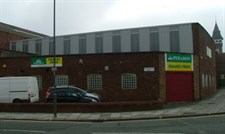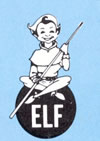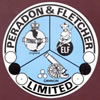
The Peradon factory based in Liverpool
Peradon History
In 1885 the Peradon business was founded by Leopold George Peradon, his father (a skilled maker of church furniture) having settled in England from France some 20 years earlier. Leopold Peradon began making cues in the finished state, the first were plain ash followed by one point, two point and then four point hand-spliced cues. It was some years before the solid butted four point machine spliced cue was introduced which later became the standard type of butt, generally used today, although superior hand spliced cues are still being manufactured.
In the early days Leopold Peradon made the cues at his home in Linacre Road, Willesden, with the assistance of his wife, who helped with the polishing and packing of the cues. He then delivered the cues by pony and trap at the same time he was able to accept orders with exact requirements from the various London billiards traders. Leopold Peradon's two sons Fredrick George and Louis Fraser, were brought into the business. They were sent to work in France in order to gain further experience and then worked back in Willesden in the family business making both machine and hand spliced billiard cues supplying them in the complete finished state to the billiards trade.
Early in the 20th century the first cue lathe was invented which allowed for the tapered turning of the cues so that the output of one man was increased from ten or 12 cues per day up to almost 140 cues per day. So great was the demand for Peradon cues that at this time another factory was opened near Beauvais, in France. The additional output being shipped to the United Kingdom until World War 1 commenced in 1914, which put an end to this operation.
During World War I Peradon made vast quantities of sticks for signaling flags which were supplied to the Ministry of Munitions as wireless communication was not in use between units of the military forces.
During the period 1929-30,
there was a tremendous increase in the demand for billiard cues,
brought about by the opening of several thousand public billiard
halls, and later still came an unprecedented demand for small cues,
required to equip the tens of thousands of under sized home tables
which were so very popular in the 1930s.
It was during the 1930s that Mr. Fredrick Peradon from the
Willesden factory, ventured into the export market, and then in
order to oblige the overseas customers commenced a wholesale
distribution service adding to their quality cue range balls,
cloth, rubber and most other accessories for the billiards and
snooker trade. In this he was assisted by his sons Mr. L. L. F.
(Bill) Peradon, who succeeded to the control of the business
following World War II. It was during the post war period that the
businesses of three other cue making companies was acquired, namely
Nidd's of Kentish Town, MacMorran's of Chalk Farm (after the merger
Peradon adopted the trade name Permac) and Weilding's of Acton.
This left Peradon as the only surviving manufacturers of billiard
cues in the entire British Commonwealth and it is to their credit
that they did not exploit the situation but served the trade
faithfully throughout many difficult years. Also during this time
Peradon made the 'own' brand cues sold by the leading Cue Sports
Companies such as Ormes, Rapers, Thurston, Ashcroft, Burroughs
& Watts etc. The Cues were made to the client's specification
with the model name and brand on the butt plates and no reference
that they were produced in the Willesden factory (Peradon's still
offer this service).
In 1966 the company was 'disturbed' as the result of local planning arrangements from their premises in Willesden and so the company was moved to new modern factory premises at Andover in Hampshire, where Mr. Bill Peradon aided by Mr. Charles Gage continued the successful operation of the business. It was hoped that Mr. Bill Peradon's son David would join the business, and so carry on the family tradition of cue making to the fourth generation, but although David worked and gained all the necessary practical experience working in the company for several years he finally decided to follow another career. In preparation for retirement Mr. Bill Peradon decided to sell his interests, but he did not want the company to be controlled by people outside the billiards trade, and so negotiations began early in 1976 with Mr. Norman Clare, of E. L. Fletcher & Son Ltd. Unfortunately Bill Peradon died in April 1977 before final arrangements has been completed. The amalgamation with E. L. Fletcher & Son, finally took place on 1st. August 1977. with Mr. Charles Gage who had been with the Peradon company for over 40 years being appointed managing director
E.L. Fletcher & Son Ltd

In 1920 Mr. E. L. Fletcher, an industrial chemist, started to manufacture a special type of wafer for fixing leather tips to billiard cues. Mr. E. L. Fletcher had been severely gassed during World War I and at times was only able to supervise production from a couch situated within the works. His special wafers proved to be vastly superior to the gelatine type of wafers, usually of French manufacture, which had been previously used for cue tipping. The new type English wafer was originally a lightyellow colour and Thurston & Co., - the London billiard table manufacturers - had sole marketing rights. Once wafer production was well established Mr. Fletcher then successfully experimented with the production of billiard cue tips which were again originally marketed through Thurston & Co. Ltd., as sole distributors.
As the quality became firmly established and as production methods became more efficient the demand for Fletcher tips and wafers within the United Kingdom and the Commonwealth was so great that Thurston's were approached and agreed to allow their sole agency to lapse so that Fletcher products could then be supplied direct to billiard table makers throughout the world. Thurston's however, retained sole right to distribute the 'yellow' wafers, whilst for the rest of the trade the colour was changed to green.
During all this Mr. Fletcher's ill health had necessitated his wife and his son Evelyn Fletcher assisting in the practical work and the administration. They also possessed all the necessary practical skill and knowledge that subsequently enabled the company to continue in the years after the death of Mr. E. L. Fletcher. Mrs. Fletcher herself died a few years after his death and then Evelyn was tragically killed in a shooting accident. The business continued under the control of Mr. Fletcher's daughter and her husband, Mr. Ashmole, who carried on the business until Mr. Ashmole died suddenly in 1971 leaving his wife (Mr. E. L. Fletcher's daughter) to operate the company. She was very resourceful and took a practical hand in the manufacture of the billiard cue tips although the production of the now famous Fletcher English green wafers had to be suspended. The closely guarded secret formula was preserved.
In 1972 Mrs. Ashmole retired from the family business and the company's trading interests were sold. Production continued at the factory premises in Baldock, and the manufacture of the green wafers was immediately recommenced, under the control of Mr. Peter Clare as managing director.
In 1975 following a
considerable expansion of the company's trading interests the
company was moved to larger factory premises in Liverpool, where
the full range of high-class billiard cue tips and the famous green
wafers, together with brass ferrules and screw tips continued to be
produced and a completely new range of moulded nylon accessories
including cue clips, rest heads of all types, pocket plates for
miniature billiard tables, a range of rest hooks, etc., was
introduced and proved to be a successful addition to the E.L.
Fletcher & Son Ltd. range of products,
which also included the wholesale distribution of snooker balls,
billiard cloth, cushion rubbers, etc.
During the early part of 1976, negotiations for an amalgamation with Messrs. Peradon & Co. Ltd., of Andover commenced which resulted in the establishment of the new company Peradon & Fletcher Ltd., in August 1977.
Peradon & Fletcher
 The company Peradon &
Fletcher Ltd., was an amalgamation of Peradon & Co. Ltd.
(including subsidiaries), the leading manufacturer of snooker and
billiard cues, with E. L. Fletcher & Son Ltd., the leading
manufacture of billiard cue tips of all types. This combination
resulted in a powerful Company that offered a first class service
to the cue sports trade in the United Kingdom and with a world wide
export trade. Mr. Charles Gage who had been with the Peradon
Company for over 40 years was made the managing director of Peradon
& Fletcher Ltd. Mr. Bendon being the most experienced cue maker
in the UK was made production Director, supported by Mr. Owen,
previously with Fletcher's at Baldock and at Liverpool, responsible
for sales and marketing. The administration offices and the
billiard cue factory were based at Andover in Hampshire whilst the
branch factory continued the manufacture of the cue tips and other
products in Liverpool. Stocks of all the other billiards and
snooker accessories were carried at both factories so that a quick
and efficient distribution service was available to the entire cue
sports trade.
The company Peradon &
Fletcher Ltd., was an amalgamation of Peradon & Co. Ltd.
(including subsidiaries), the leading manufacturer of snooker and
billiard cues, with E. L. Fletcher & Son Ltd., the leading
manufacture of billiard cue tips of all types. This combination
resulted in a powerful Company that offered a first class service
to the cue sports trade in the United Kingdom and with a world wide
export trade. Mr. Charles Gage who had been with the Peradon
Company for over 40 years was made the managing director of Peradon
& Fletcher Ltd. Mr. Bendon being the most experienced cue maker
in the UK was made production Director, supported by Mr. Owen,
previously with Fletcher's at Baldock and at Liverpool, responsible
for sales and marketing. The administration offices and the
billiard cue factory were based at Andover in Hampshire whilst the
branch factory continued the manufacture of the cue tips and other
products in Liverpool. Stocks of all the other billiards and
snooker accessories were carried at both factories so that a quick
and efficient distribution service was available to the entire cue
sports trade.
Peradon
In 1994 the brand was taken on by E A Clare & Son Ltd who also purchased the machinery and stocks and invested in a new factory site in Liverpool. Product lines were improved and expanded and Peradon were appointed official distributors of Strachan of 'West of England' cloth and Saluc 'Aramith' Snooker, Pool and Billiard balls.
The reputation of Peradon cues has been acknowledged since the early days by such notable players as Walter Lindrum and Joe Davis, and continues to the present day. It is probably true that most, if not all, of top UK players have used a Peradon made cue. A board in the production directors office shows all the butt plates from Peradon cues endorsed over the years and is a veritable 'who's who' of Billiards and Snooker.
Since 1885 the Peradon name has been at the forefront of innovation in cue design and manufacture. In 2002 they again showed the lead by introducing a 'bespoke' cue making service over the internet with 'CueWizard©'. This service is possible due to significant timber stocks, enabling part prepared shafts to be left to settle and held in stock. We also hold a full range of exotic timbers for butts and splices.
